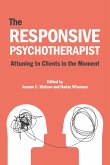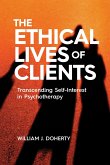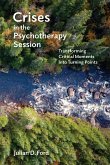Kenneth S Pope, Nayeli Y Chavez-Dueñas, Hector Y Adames, Janet L Sonne, Beverly A Greene
Speaking the Unspoken
Breaking the Silence, Myths, and Taboos That Hurt Therapists and Patients
Kenneth S Pope, Nayeli Y Chavez-Dueñas, Hector Y Adames, Janet L Sonne, Beverly A Greene
Speaking the Unspoken
Breaking the Silence, Myths, and Taboos That Hurt Therapists and Patients
- Broschiertes Buch
- Merkliste
- Auf die Merkliste
- Bewerten Bewerten
- Teilen
- Produkt teilen
- Produkterinnerung
- Produkterinnerung
This book discusses how silence around taboo topics can undermine the teaching, practice, and profession of psychotherapy.
Andere Kunden interessierten sich auch für
![The Responsive Psychotherapist The Responsive Psychotherapist]() The Responsive Psychotherapist77,99 €
The Responsive Psychotherapist77,99 €![The Ethical Lives of Clients The Ethical Lives of Clients]() William J DohertyThe Ethical Lives of Clients54,99 €
William J DohertyThe Ethical Lives of Clients54,99 €![Helping Couples on the Brink of Divorce Helping Couples on the Brink of Divorce]() William J DohertyHelping Couples on the Brink of Divorce89,99 €
William J DohertyHelping Couples on the Brink of Divorce89,99 €![Crises in the Psychotherapy Session: Transforming Critical Moments Into Turning Points Crises in the Psychotherapy Session: Transforming Critical Moments Into Turning Points]() Julian D. FordCrises in the Psychotherapy Session: Transforming Critical Moments Into Turning Points64,99 €
Julian D. FordCrises in the Psychotherapy Session: Transforming Critical Moments Into Turning Points64,99 €![Therapeutic Presence Therapeutic Presence]() Shari GellerTherapeutic Presence58,99 €
Shari GellerTherapeutic Presence58,99 €![Therapists' Sexual Feelings and Fantasies Therapists' Sexual Feelings and Fantasies]() Kenneth S. PopeTherapists' Sexual Feelings and Fantasies52,99 €
Kenneth S. PopeTherapists' Sexual Feelings and Fantasies52,99 €![Rupture and Repair in Psychotherapy Rupture and Repair in Psychotherapy]() Rupture and Repair in Psychotherapy50,99 €
Rupture and Repair in Psychotherapy50,99 €-
-
-
This book discusses how silence around taboo topics can undermine the teaching, practice, and profession of psychotherapy.
Hinweis: Dieser Artikel kann nur an eine deutsche Lieferadresse ausgeliefert werden.
Hinweis: Dieser Artikel kann nur an eine deutsche Lieferadresse ausgeliefert werden.
Produktdetails
- Produktdetails
- Verlag: American Psychological Association (APA)
- Seitenzahl: 190
- Erscheinungstermin: 6. Juni 2023
- Englisch
- Abmessung: 229mm x 156mm x 12mm
- Gewicht: 290g
- ISBN-13: 9781433841590
- ISBN-10: 1433841592
- Artikelnr.: 65576665
- Herstellerkennzeichnung
- Libri GmbH
- Europaallee 1
- 36244 Bad Hersfeld
- gpsr@libri.de
- Verlag: American Psychological Association (APA)
- Seitenzahl: 190
- Erscheinungstermin: 6. Juni 2023
- Englisch
- Abmessung: 229mm x 156mm x 12mm
- Gewicht: 290g
- ISBN-13: 9781433841590
- ISBN-10: 1433841592
- Artikelnr.: 65576665
- Herstellerkennzeichnung
- Libri GmbH
- Europaallee 1
- 36244 Bad Hersfeld
- gpsr@libri.de
Kenneth S. Pope, Nayeli Y. Chavez-Dueñas, Hector Y. Adames, Janet L. Sonne, and Beverly A. Greene
Dedication
Acknowledgements
Introduction: Unspoken Topics in Psychotherapy and How This Book Can Help
Break the Silence
Part I: The Problem of the Unspoken
1. A Chilling Context for Psychotherapy: Cancel Culture, Hyperpolarization,
Books and Topics Banned by the State, Frightened Academics, and
Self-Censorship
2. A Silenced Profession: The Toxic Effects of Taboo Topics
3. Systems of Silencing and Cognitive Cues for Keeping Quiet
4. An Example of the Problem: Therapists' Sexual Attractions, Arousals, and
Fantasies
Part II: Preparing to Break the Silence
5. Looking Inward: A Self-Assessment of How We Respond to Challenging
Topics
6. Strengthening the Courage to Speak Up: Creating a Supportive Context
Part III: Speaking the Unspoken—Exercises for Exploring and Learning
7. Talking About Physical Difference and Disability
8. Talking About Sexual and Affectional Orientation
9. Talking About Sexual Reactions to Clients
10. Talking About Anger
11. Talking About Oppression
12. Speaking Up About White Supremacy Culture
13. Talking About Religion
14. Talking About Money and Fees
15. Talking About Death and Dying
Part IV: Speaking the Unspoken Beyond Psychotherapy
16. Speaking Up in Supervision and Consultation
17. Speaking Up in the Profession and the Community
Part V: But What If...
18. Hitting a Wall, or The Wall Hitting Us: What to Do When Confused,
Scared, Disheartened, or Stuck
References
About the Authors
Index
Acknowledgements
Introduction: Unspoken Topics in Psychotherapy and How This Book Can Help
Break the Silence
Part I: The Problem of the Unspoken
1. A Chilling Context for Psychotherapy: Cancel Culture, Hyperpolarization,
Books and Topics Banned by the State, Frightened Academics, and
Self-Censorship
2. A Silenced Profession: The Toxic Effects of Taboo Topics
3. Systems of Silencing and Cognitive Cues for Keeping Quiet
4. An Example of the Problem: Therapists' Sexual Attractions, Arousals, and
Fantasies
Part II: Preparing to Break the Silence
5. Looking Inward: A Self-Assessment of How We Respond to Challenging
Topics
6. Strengthening the Courage to Speak Up: Creating a Supportive Context
Part III: Speaking the Unspoken—Exercises for Exploring and Learning
7. Talking About Physical Difference and Disability
8. Talking About Sexual and Affectional Orientation
9. Talking About Sexual Reactions to Clients
10. Talking About Anger
11. Talking About Oppression
12. Speaking Up About White Supremacy Culture
13. Talking About Religion
14. Talking About Money and Fees
15. Talking About Death and Dying
Part IV: Speaking the Unspoken Beyond Psychotherapy
16. Speaking Up in Supervision and Consultation
17. Speaking Up in the Profession and the Community
Part V: But What If...
18. Hitting a Wall, or The Wall Hitting Us: What to Do When Confused,
Scared, Disheartened, or Stuck
References
About the Authors
Index
Dedication
Acknowledgements
Introduction: Unspoken Topics in Psychotherapy and How This Book Can Help
Break the Silence
Part I: The Problem of the Unspoken
1. A Chilling Context for Psychotherapy: Cancel Culture, Hyperpolarization,
Books and Topics Banned by the State, Frightened Academics, and
Self-Censorship
2. A Silenced Profession: The Toxic Effects of Taboo Topics
3. Systems of Silencing and Cognitive Cues for Keeping Quiet
4. An Example of the Problem: Therapists' Sexual Attractions, Arousals, and
Fantasies
Part II: Preparing to Break the Silence
5. Looking Inward: A Self-Assessment of How We Respond to Challenging
Topics
6. Strengthening the Courage to Speak Up: Creating a Supportive Context
Part III: Speaking the Unspoken—Exercises for Exploring and Learning
7. Talking About Physical Difference and Disability
8. Talking About Sexual and Affectional Orientation
9. Talking About Sexual Reactions to Clients
10. Talking About Anger
11. Talking About Oppression
12. Speaking Up About White Supremacy Culture
13. Talking About Religion
14. Talking About Money and Fees
15. Talking About Death and Dying
Part IV: Speaking the Unspoken Beyond Psychotherapy
16. Speaking Up in Supervision and Consultation
17. Speaking Up in the Profession and the Community
Part V: But What If...
18. Hitting a Wall, or The Wall Hitting Us: What to Do When Confused,
Scared, Disheartened, or Stuck
References
About the Authors
Index
Acknowledgements
Introduction: Unspoken Topics in Psychotherapy and How This Book Can Help
Break the Silence
Part I: The Problem of the Unspoken
1. A Chilling Context for Psychotherapy: Cancel Culture, Hyperpolarization,
Books and Topics Banned by the State, Frightened Academics, and
Self-Censorship
2. A Silenced Profession: The Toxic Effects of Taboo Topics
3. Systems of Silencing and Cognitive Cues for Keeping Quiet
4. An Example of the Problem: Therapists' Sexual Attractions, Arousals, and
Fantasies
Part II: Preparing to Break the Silence
5. Looking Inward: A Self-Assessment of How We Respond to Challenging
Topics
6. Strengthening the Courage to Speak Up: Creating a Supportive Context
Part III: Speaking the Unspoken—Exercises for Exploring and Learning
7. Talking About Physical Difference and Disability
8. Talking About Sexual and Affectional Orientation
9. Talking About Sexual Reactions to Clients
10. Talking About Anger
11. Talking About Oppression
12. Speaking Up About White Supremacy Culture
13. Talking About Religion
14. Talking About Money and Fees
15. Talking About Death and Dying
Part IV: Speaking the Unspoken Beyond Psychotherapy
16. Speaking Up in Supervision and Consultation
17. Speaking Up in the Profession and the Community
Part V: But What If...
18. Hitting a Wall, or The Wall Hitting Us: What to Do When Confused,
Scared, Disheartened, or Stuck
References
About the Authors
Index








